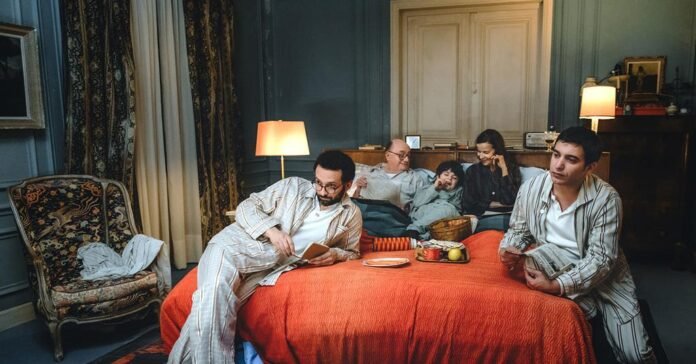Dir: Lionel Baier. Switzerland/Luxembourg/France. 2025. 92mins
As the scholar protests of Might 1968 tear via the streets of Paris, an eight-year-old boy (Ethan Chimienti) is delighted to gap up along with his grandparents, his two uncles and his larger-than-life Odessa-born Jewish great-grandmother of their Bohemian and decidedly down-at-heel mansion within the metropolis’s upscale Rue-de-Grenelle. Then the reassuring however insular eccentricity of the household is disrupted by an sudden customer pleading for shelter. The newest from Swiss filmmaker Lionel Baier is customized from the 2015 Prix Femina-winning memoir La Cache, written by Christophe Botanski (who was the kid within the story). Just like the household residence, the movie is cluttered and self-consciously quirky, however followers of the e-book might join with the atmospheric chaos of the storytelling.
Cluttered and self-consciously quirky
This is the primary look in Berlin’s major competitors for Baier, whose most up-to-date options, Continental Drift (South) and Self-importance, each premiered in Cannes. Rambling, verbose and maybe slightly self-satisfied, his newest image will join most efficiently with French audiences; notably these aware of Botanski’s supply materials and with the writer’s uncle, the famend conceptual artist Christian Botanski, who’s depicted on the very begin of his profession in this movie. Elsewhere, the reception is more likely to be muted for all however probably the most avid Francophiles.
A narration, seemingly attributable to the writer of the movie quite than the writer of the story, units the scene by acknowledging that the image we’re about to see relies on a e-book, which relies on a childhood. He then goes on to attract a big query mark over the credibility of the story, adopting a sort of Schrodinger’s cat method to details. “When you imagine me,” the voice dissembles, “I’ll inform the reality.” Having cleared that up (or not, relying whether or not you’ll be able to carry your self to place your religion within the storytelling), the movie, accompanied by a skittering jazz rating, introduces the important thing characters.
The kid’s dad and mom – not one of the characters are named, other than the great-grandmother (Liliane Rovère), who’s referred to throughout the household as ’Hinterland’ – are background gamers within the story. Caught up within the revolutionary fervour of the second, they offload their baby onto his grandparents. It’s a curious arrange. Grandpapa (Michel Blanc) is a revered physician who, based on his household, is overdue recognition by the governing medical physique. Grandpapa, nonetheless, is a timid creature who finally ends up cowering underneath the desk and lined in meat juices throughout a lunch along with his esteemed colleagues.
In distinction, Grandmama (Dominique Reymond) is resourceful and dynamic; she’s not about to let the very fact of her incapacity (she has partial paralysis in her leg) get in the best way of battling on behalf of her household. She negotiates the sale of her youthful son’s work from the protection of the household automobile; years earlier than, she devised an ingenious scheme to guard her Jewish husband from the occupying Nazi forces. Then there’s Hinterland, who’s keen on vodka and constant to Odessa above all different locations, even Paris.
It’s a supportive, close-knit household surroundings, and one which isn’t fully wholesome. The 2 uncles, Nice-Uncle (William Lebghil) and Little-Uncle (Aurélien Gabrielli), appear half-formed as adults, quite too snug within the home nest to strike out on their very own. And who can blame them? Véronique Sacrez’s dense, detailed manufacturing design captures the idiosyncratic persona of the house all of them share, an opulent however quite grubby maze of rooms, piled excessive with books and artwork; reverberating with confidently voiced opinions and, in Hinterland’s quarters, classical music by Russian composers performed at ear-splitting volumes.
Baier nods to the interval during which the movie is ready with a smattering of playful New Wave prospers. However finally the movie, just like the inhabitants of the Rue-de-Grenelle mansion, doesn’t actually go wherever.
Manufacturing firm: Bande à half Movies
Worldwide gross sales: MK2 movies intlsales@mk2.com
Producers: Agnieszka Ramu, Laetitia Gonzalez, Yaël Fogiel, Vincent Quénault, Jeanne Geiben
Screenplay: Lionel Baier, Catherine Charrier
Cinematography: Patrick Lindenmaier
Manufacturing design: Véronique Sacrez
Enhancing: Pauline Gaillard
Music: Diego Baldenweg, Nora Baldenweg, Lionel Baldenweg
Important forged: Dominique Reymond, Michel Blanc, William Lebghil, Aurélien Gabrielli, Liliane Rovère, Ethan Chimienti, Adrien Barazzone, Larisa Faber








